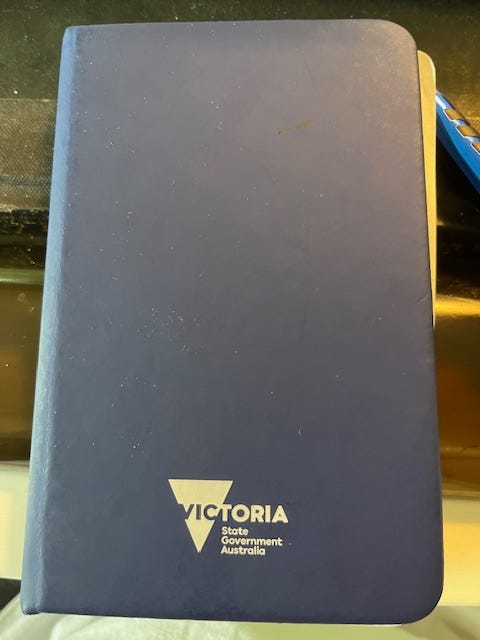The Unplugging Playbook, Part 2
Find the nearest hammock! It's time for steps 7-12.

Hi everyone!
Here is part two of my series on how to unplug the right way. If you missed part one, you can read it here.
Let’s dive right in.
7. Some work is okay (no seriously, it is)
One of the reasons we choose to unplug is to get away from work. But what if you truly love what you do?
Author Paul Kix discussed this topic in a recent LinkedIn post. Paul was on “vacation”, but because he loves to write so much, he incorporated it into his daily routine.
My favorite line: “I love what I do, so why take a reprieve from life itself?”
This is a fair point. If you’re one of the lucky people who’s energized — and not drained — by their work, then by all means incorporate it into your time off!
Just make sure, if the answer’s yes, that you’re not deceiving yourself. What I mean is, sometimes we can trick ourselves into believing that we love our work, when in reality we’re a workaholic who simply doesn’t know how to stop.
If you truly love what you do, read on. But if you’re a workaholic, or you aren’t good at being idle, let me suggest an offramp: try a different type of work.
If you’re a nonfiction writer who can’t imagine not writing, try your hand at fiction or poetry.
If you’re an entrepreneur who struggles with work/life balance, read a business biography instead.
If you’re a photographer, try painting.
And so on and so forth. It’s still “work” to some extent, but it lets you disconnect just enough to relax the part of your brain that’s always on.
I love to write, so although I wasn’t working on my newsletter for a few weeks, I pursued an ebook idea I had kept on the back burner. It turned into a book! In a fevered few days, I wrote the entire first draft and felt great doing it. It was a different kind of writing, but it was energizing.
8. Keep a notebook close by
Breakthrough ideas and solutions to difficult problems have a maddening way of popping into our heads right when we’re trying to relax. (Thanks, subconscious mind.)
This is going to happen to you when you unplug — it’s guaranteed.
The solution? Keep a notebook nearby to capture thoughts as they surface.
But here’s the key — unless it’s something that needs to be done immediately, let these ideas go. If you stop to act on everything you write down, you’re never going to relax.
Circle back to these ideas when you return to the real world. Chances are, when you go through the list, you’ll see that many of the ideas that seemed great at the time weren’t all that important.
But a few of them will be gems. Pat yourself on the back for remembering them!
If you can, use a physical notebook. A digital notetaking app is fine, but it’s awfully close to the other apps you might be trying to avoid, or to a browser that will suck you back into the news vortex.

9. Prioritize meaningful connection….
Unless your break involves some Bear Gryllsian adventure into the wilderness, chances are you’re going to be surrounded by other people.
One of the benefits of unplugging is that it gives us more time to have meaningful conversations with those we care about. (Unless you’re surrounded by people you want to avoid. If so, I can’t help you.)
The best part of taking time off is that our schedules are wide open. Fewer commitments means more time for small talk, and, when necessary, heart-to-hearts.
When was the last time you were fully present in a conversation, actively listening to every word? It’s probably been a while.
One of the reasons I took time off was to have the space to be fully present for my sister and her kids. I didn’t want to be half-listening as I worried about the narrative arc of an upcoming post. I know myself; that would have happened.
I’m happy to say that I kept to this commitment. It was so nice to spend time with them, especially since I don’t see them in person all that often.
Next time you unplug, remember this adage: people before productivity.
There’s nothing better.
10. …But also embrace solitude
People are great, but so is spending time alone.
Solitude is restorative. There’s something about being in nature — or in a secluded, quiet place, reflecting on life — that kicks relaxation into overdrive, especially when electronics are nowhere to be found.
It’s hard to think deeply when we’re inundated with notifications, emails, hot takes, work minutiae, and other stimuli at all hours of the day.
When we’re alone, we can contemplate our hopes and dreams. We can wrestle with our purpose. We can plan for the future. We can slow down our thoughts, or if we prefer, think about nothing at all.
In the past, when I’ve been able to spend time deep in thought, my life has changed for the better. Deciding to go to business school and starting this newsletter are two significant milestones that were made possible by quiet contemplation.
Admittedly, there is one drawback to solitude. It doesn’t mean we shouldn’t do it, it’s just something to be aware of.
When we’re thinking about life, especially when we’re struggling with life, being alone with our thoughts can make us feel more stressed, not less.
This happened to me on my break.
I was trying to relax one morning, when I began thinking about the future, including all I had yet to accomplish or would never get to achieve. I felt an unease in the pit of my stomach, which soon morphed into full-blown anxiety.
I worried about my disease progression. My health. My family’s health. Whether I’d ever find “the one”. My living situation. My finances. My career. The state of the world.
I was beginning to spiral.
I went outside and did a lap around the neighborhood, then another one. All the while, I bargained with myself that I needed to let go of these worries, at least for the time being. They were valid concerns, but there was nothing I could do about them at that moment. And some of them, like the state of the world, were out of my control entirely.
When I got back, I wrote my worries down in my notebook so I could get them out of my head. I reminded myself that by resting, I was giving myself the headspace to tackle these issues at a later date.
After that, I felt much better.
11. Test it out
Does this whole idea of unplugging seem too intimidating? If so, take baby steps.
For example, if you’re thinking of unplugging for an entire week, test it out on a Sunday first. Can you go 24 hours without electronics? Can you read a book for an hour straight without checking your phone? Can you resist the urge to keep up to date with what’s happening in the world?
Like anything, it will take practice. We’ve been “on” for so long, that it’s not easy to switch “off” without friction and discomfort.
You don’t bench press 300 pounds on your first day of lifting. You don’t run 26.2 miles on the first day of marathon training.
So start small. Unplug for one hour, then work your way up to two hours, then three. Once you’re able to succeed consistently, you’ll gain confidence that you can do it for longer periods of time.
12. Reflect afterwards
So you’ve unplugged successfully for a few days. Great! But your work isn’t done.
After your break is complete, and you’ve plugged back into the messiness of the real world, take a few minutes to reflect on how things went.
What worked? What didn’t? Maybe you wrote down all your unfinished tasks but failed to set boundaries. Or maybe you were able to avoid social media but got sucked into the day’s news.
If you didn’t do as well as you’d hoped, that’s okay. Jot down a few learnings and think through how you could do better next time.
Upon reflection, there were several areas where I could have done better. I failed to set proper boundaries, and I was unprepared for the onslaught of worries lurking below the surface.
These are two challenges I’ll be ready for next time.
We all deserve a break
Life is chaotic and exhausting. We may be able to manage over the short term, but without a break, we’ll eventually crash and burn.
Learning how to unplug is a valuable life skill. And let’s not forget — taking a break is meant to be fun!
In talking with many of you over the last few months, I know that you’re feeling overwhelmed by life. My hope this list helps you avoid burnout and inspires you to take some time for yourself.
Remember: you don’t have to do all 12 steps perfectly to experience a major benefit. Just do your best!
🫵 Audience Participation
It’s your turn! What are your favorite unplugging tips? Let me know in the comments below. 👇





You're unplugging series actually inspired me to take a break from writing here, which I've never done before. I love writing here, but wanted to give myself a little breathing room to regroup and refocus (and catch up on so many posts that I've been missing). So thank you for that 😊
Solid points again. I can relate to having to be doing something, because in my view, this is part of human nature. But yes, we can tune in to something fun around what we usually do instead.
Thank you, and it’s all gone in my toolkit!